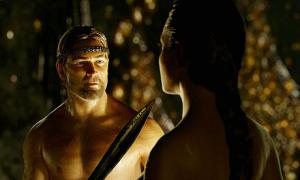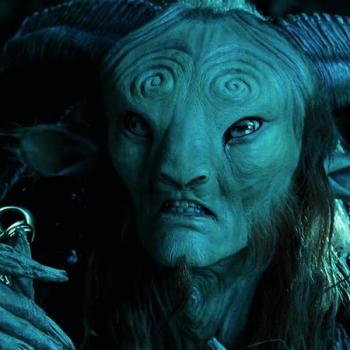
Robert Zemeckis’s 2007 film Beowulf is a curious beast. It’s a PG-13 motion-capture/CGI hybrid, one that frequently strays into the uncanny valley while nevertheless packing in more gore and sensuality than Braveheart or Kingdom of Heaven. It was directed by the man responsible for Back to the Future and Forrest Gump, from a script coauthored by legendary fantasy author Neil Gaiman—the mind behind stories like Coraline and Stardust. And, well, it takes certain liberties with the narrative architecture of its source material.
And yet for all its weirdness, I’ve kept coming back to it for almost fifteen years. Perhaps it’s the surreal and haunting visuals—a monster’s bloody arm dangling from the rafters of a mead-hall, a northern church in flames, a dragon transforming into a golden-skinned man—or the pulse-pounding score. But most likely, my appreciation has something to do with the fact that it seems to communicate something profoundly true about the poem it adapts, tapping into currents within the original work to cultivate a richer appreciation of the ancient epic itself. Like HBO’s Watchmen series or Madeline Miller’s The Song of Achilles and Circe, it manages to nuance the original text without subverting it or reading it against itself.
Over the years, I’ve aired this positive opinion of the film on a few different occasions, and almost without fail I’ve met with pushback from smart folks I know. To their minds, Zemeckis and Gaiman managed to miss the point altogether, delivering only a deconstructed, sexed-up reading of a deeply Christian tale. I would strongly disagree with that interpretation—but beyond a few Facebook comments here and there, I’ve never taken the time to justify, at length, my admiration for this particular retelling.
What is it that makes this film that rarest of things—a retelling that builds upon, and in some sense elevates, its source material?
The poem of Beowulf begins in crisis: Danish king Hrothgar’s mead-hall of Heorot is being ravaged by a primal horror. The noise and commotion of Heorot has roused the monstrous Grendel, a creature spawned from the line of the biblical Cain, with a taste for human blood. For twelve years, Grendel renders Heorot desolate, until the eponymous hero—mightiest of the Geats—arrives to slay the beast. Beowulf promptly dispatches Grendel, but then must duel and overcome his mother, a “swamp-thing from hell” (1518) in the depths of a dark lake. Following his twin victories, Beowulf returns home in glory and takes the throne “for fifty winters,” growing “old and wise as warden of the land.” (2208–10) When a monstrous dragon emerges from its slumbers to plague his kingdom, the aging monarch proudly rides to battle, but is overwhelmed by the beast and perishes in the struggle—passing the crown to his sword-brother Wiglaf in his dying moments.
Gaiman’s adaptation shares roughly the same plot beats, but takes numerous liberties with the narrative structure. Most notably, here Grendel’s mother (played by Angelina Jolie) is no “tarn-hag” (1519), but a beautiful succubus longing for a child. Beowulf, despite himself, succumbs to her wiles when she promises him undying glory—and that sin becomes the ruin of him. Grendel, we eventually learn, was really Hrothgar’s own misbegotten son; in turn, the dragon that ultimately brings Beowulf to ruin proves to be Beowulf’s child. The film ends, like the poem, with the tragic death of its hero—yet shows in an eerie epilogue that Wiglaf himself must confront the same temptation that felled both Hrothgar and Beowulf.
Quite different, indeed. In the poem, it is Beowulf’s pride in his martial skills that serves as his tragic flaw, and that ultimately leads to his undoing. The film’s central theme, by contrast, is captured in the screams of a badly burned survivor of a dragon attack: “the sins of the fathers!”
But there is a different, and subtler, thematic distinction between poem and movie. Ostensibly, the poem depicts the encounter between Beowulf’s Christian Geats and Hrothgar’s pagan Danes; in Gaiman’s version, by contrast both Geatland and Denmark alike are committed to the ancient Norse faith of Odin and Thor, although Christianity has begun to make inroads. Over the course of Beowulf’s kingship, the new faith spreads further and further into Denmark—a development that, in Gaiman’s framing, can only be experienced as tragic. “We men are the monsters now,” Beowulf remarks ruefully. “The time of heroes is dead, Wiglaf—the Christ God has killed it, leaving humankind with nothing but weeping martyrs, fear, and shame.” In Gaiman’s adaptation, Beowulf is a pagan among pagans, not a Christian messenger coming to rid Hrothgar’s land of evil. Hence, the critique of Beowulf the film: in collapsing this critical difference between Beowulf and the Danes, Hollywood has allegedly torn the story loose from its spiritual foundation, betraying the original text in the process, and in its place substituted mere CGI lasciviousness.
But is Gaiman’s adaptation indeed untrue to the source material? That is the crucial question—and a careful reading of the text suggests that 2007’s Beowulf is a film fully consonant with the poet’s vision.
Begin, perhaps, by considering a simple question: metaphysically speaking, what exactly is the nature of the God to whom the poem’s Beowulf prays? On the face of the text, the poet uses the language of Christian monotheism, but his concept of divinity seems to be quite far from the dynamic, people-choosing, history-shaping deity of the Old Testament. Specifically, Beowulf’s God is a distant and deterministic presence, so abstract that one could without confusion substitute the word Fate (or Doom, or Nature) for God. Indeed, prior to confronting Grendel, Beowulf implicitly conflates the two, remarking that “[w]hichever one death fells / must deem it a just judgement by God.” (440–41) So too, during Beowulf’s battle against Grendel’s mother, the concepts of pagan fate and divine providence find themselves intertwined:
The son of Ecgtheow would have surely perished
and the Geats lost their warrior under the wide earth
had the strong links and locks of his war-gear
not helped to save him: holy God
decided the victory. It was easy for the Lord,
the Ruler of Heaven, to redress the balance
once Beowulf got back up on his feet. (1550–56)
In this struggle, God only appears to “decide[] the victory” in the sense that Beowulf’s armor happens to protect him; there is no moment of miraculous deliverance, as in the Old Testament, that transcends the ordinary course of events. Whatever it means for Beowulf to be “favored by God” is something very different than what it means for, say, Abraham or Samson. Here whatever happens, ipso facto, must be God’s will. “Past and present, God’s will prevails,” the poet editorializes. (1057)
To be sure, that notion is consistent with Christian orthodoxy in a superficial sense—but a closer look raises additional questions. To use the language of Reformed scholasticism, Beowulf does not distinguish between the decretive will of God, which ordains what must be, and the permissive will of God, which ordains what is possible. This distinction is theologically significant; most importantly, it avoids inculpating God in the evil wrought by creatures. And yet in Beowulf, all that occurs seems to find itself collapsed into the decretive will. If whatever “happens to happen” is somehow a direct expression of the divine will, then the evil done by Grendel and his mother (and the dragon at the poem’s conclusion) enjoys in some sense a divine warrant or sanction.
Again, perhaps from a certain perspective this theological vision can be made consistent with Christian theology. But on the whole, it strikes me as far more consistent with the older pagan ideas of Fate and Doom than with Christian theism. The deities of the Norse mythic tradition are well aware of their predestined ends—the eventual death of Odin in the jaws of the wolf Fenrir, and the death of Thor in battle with the serpent Jörmungandr, to name but two. Like Beowulf, their outcomes are preordained. And in that strong sense of impending destiny, there is an ontological collapse of any interval between what ought to be and what is—or, put in different words, the pagan tradition embraces the already of the Christian proclamation without the accompanying not yet. On this view, there is no distinction between the present “Kingdom of God” and a Kingdom yet to come; all that matters, ethically, is coming to terms with one’s fated end.
Perhaps, though, this whole point can be made even more simply: nowhere in the poem do the words Christ or Jesusappear. And consistent with that silence, Beowulf contains no talk of the forgiveness of sins or the healing of spiritual damage. Similarly, salvation is not conceived in terms of redemption or deliverance or theosis, but rather as brotherhood and acceptance. “[B]lessed is he / who after death can approach the Lord / and find friendship in the Father’s embrace,” writes the poet. (186–88) It is easy to picture Valhalla, and Odin’s brotherhood of regenerating einherjar warriors, here—far easier than to glimpse the Beatific Vision.
And so, what then? If one cannot really speak of the triune God of Christian faith, but rather of a God who is solely “Almighty Judge of good deeds and bad . . . Head of the Heavens and High King of the World” (180–82), what then does this mean for Beowulf’s characters who most desperately require salvation? Nothing promising—particularly where Grendel and his mother are concerned.
Grendel was the name of this grim demon
haunting the marches, marauding round the heath
and the desolate fens; he had dwelt for a time
in misery among the banished monsters,
Cain’s clan, whom the Creator had outlawed
and condemned as outcasts. For the killing of Abel
the Eternal Lord had exacted a price:
Cain got no good from committing that murder
because the Almighty made him anathema
and out of the curse of his exile there sprang
ogres and elves and evil phantoms
and the giants too who strove with God
time and again until He gave them their reward. (102–14)
In Beowulf, Grendel and his mother—despite originating from human stock—are reduced to “life unworthy of life,” to those who are “outlawed and condemned as outcasts” for all time. And Beowulf himself, naturally, destroys them: Grendel gives out “a God-cursed scream and strain of catastrophe” in his dying moments (785), and his mother fares no better. Both are obliterated mercilessly, and the creation rejoices. (1570–73)
And yet it seems to me that a genuinely Christian Beowulf would be a figure capable of glimpsing the image of God in, yes, even the monstrous Grendel himself. Grendel is, in some primordial sense, a person like Beowulf—and yet he is denied even the possibility of redemption or forgiveness. But is this altogether surprising? After all, Beowulf’s God, who gives him the strength to strike down mother and child alike, seems to have no Son who might atone for the sins of both Grendel and Beowulf, who might represent the “second Adam” that is the perfection of the humanity they both share. God/Fate/Nature is simply the Judge, the High King who rules and punishes.
For all these reasons, it seems to me that Gaiman is perfectly justified in his attempt to reclaim a pagan Beowulf, one not quite willing to veil his stark theology in Christian idiom. But what of the other changes—such the metamorphosis of Grendel’s mother from hag to siren, and the reframing of the story around the consequences of disordered desire? Are these modifications so subversive that they cut out the heart of the poem?
I don’t think so. On the face of things, the relative sexlessness of the poem is notable—particularly given that, even after acceding to the throne of Geatland, Beowulf takes no queen and produces no heir. Given that fact, it strikes me as perfectly reasonable to ask why not? Might, perhaps, something in Beowulf’s past have to do with it? One can simply call this an unanswerable question outside the scope of the poem, rather like how many children had Lady Macbeth?, but I find it far more interesting to engage the matter directly.
The poem appears to leave the door open for speculation along these lines. Early on, in recounting a swimming-race during which he was attacked by sea monsters, Beowulf explains away his loss by blaming a final beast for dragging him to the bottom of the ocean. Gaiman’s adaptation nuances this account by opening up the possibility that Beowulf himself is an unreliable narrator: while Beowulf’s verbal explanation of his feat largely mirrors the poem, viewers glimpse Beowulf not only tearing through monsters, but ultimately lingering in the embrace of a seductive sea nymph—a far cry from the brutal struggle he claims. Is this twist a shamelessly revisionist move, a sop to lascivious modern sensibilities? Not exactly, given that the poem itself seems to permit such a reading. In Beowulf’s telling,
some ocean creature
pulled me to the bottom. Pinioned fast
and swathed in its grip, I was granted one
final chance: my sword plunged
and the ordeal was over. (553–57)
This is, from a certain point of view, rather suggestive language—a pattern that recurs during Beowulf’s conflict with Grendel’s villainous mother.
Then the prince of War-Geats, warming to this fight
with Grendel’s mother, gripped her shoulder
and laid about him in a battle frenzy:
he pitched his killer opponent to the floor
but she rose quickly and retaliated,
grappled him tightly in her grim embrace.
The sure-footed fighter felt daunted,
the strongest of warriors stumbled and fell. (1537–44)
Is the reader required to believe that there is no connection between the sterility of Beowulf’s land and these heated, passionate encounters with strange creatures where no one is watching? Should we trust Beowulf to tell us the truth about what happens in the dark depths?
Maybe not. After all, the reader of the poem (and for that matter, the viewer of the film) knows that Beowulf is devoted, above virtually all else, to the glory of his own name. Beowulf delivers “formal boast[s]” (639, 2510) prior to facing both Grendel and the final dragon, and at the poem’s end an aging Beowulf rides into battle “as king of the people . . . for the glory of winning.” (2514) Immortality, for Beowulf, is bound up with the prestige of his name. Is it really so implausible that such a man as this would finesse the truth when convenient?
This orientation toward the self proves to be a common thread spanning poem and film alike. In Gaiman’s adaptation, the sin of lust does not, exactly, supplant arrogance as Beowulf’s tragic flaw, but rather manifests that very hubris. In enjoying sexual congress with Grendel’s mother—with the full knowledge that she seeks a son to replace the one she lost—Gaiman’s Beowulf displays an arrogant disregard for the potential consequences. And ultimately, both vices are inextricably bound up with Beowulf’s pagan milieu: in a world lacking the possibility of genuine resurrection, the glorification of one’s name and the perpetuation of one’s bloodline become urgent imperatives if one is to enjoy any meaningful “life after death.”
As bleak as that portrait of the world may appear, it is entirely on brand for Gaiman. In Nietzschean fashion, Gaiman’s work often seems incapable of grasping Christianity as anything other than an anti-human morality of shame and guilt, or a stern and Puritanical faith committed to the denigration of the material. On this view, the triumph of Christianity was primarily a process of sterilization, a kind of obliteration of the mystery and meaning that once formed the bedrock of society.
And yet Gaiman’s “pagan” sensibility is not in any sense romanticized. Like Pan’s Labyrinth director Guillermo del Toro, Gaiman is absorbed by outsider characters, the enigmatic trickster figures that once populated the pagan world—though Gaiman’s work is altogether devoid of del Toro’s sacramental consciousness, the distinctively “Catholic” sense of eternal beauty just beneath the surface. Instead, Gaiman’s work offers tragedy without consolation, a profound awareness of the fleetingness of the whimsy he depicts. The elegiac The Graveyard Book and The Ocean at the End of the Lane speak poignantly of the fragility of human lives and families, and American Gods and Neverwhere teach that even the world’s powers and principalities are subject to the same decay. And The Sandman, Gaiman’s best-known and finest work, chronicles its mystical protagonist’s lonely sojourn in an ultimately indifferent cosmos.
At times, this critical orientation becomes particularly pronounced: Gaiman’s Beowulf is in many ways a full-on indictment of the very pagan culture he otherwise seems to admire so profoundly. Here, Beowulf’s power-hungry coupling with Grendel’s mother is not, as in Celtic tradition, a sacred union of horned god and mother-goddess that fertilizes the land itself; it is rather an offense against an overarching order of things, a transgression demanding violent atonement. The message is clear enough: if Beowulf had remained continent and chaste, he would have faced no tragic end. Beowulf’s susceptibility to the delights of the pagan order—feasting, fighting, and lusting—is the root of his destruction.
And yet Gaiman sees no real pathway forward—nothing beyond a wistful appreciation of the glories that once were, before “weeping martyrs, fear, and shame” took over the zeitgeist. Any lasting hope, if it is to be found at all, cannot be located within the horizon of Gaiman’s cosmos—it must be sought somewhere out beyond the end of Ragnarok, the great battle of gods and monsters towards which all things are hurtling.
In the end, as I encounter it, Beowulf must always be a story of the terrible weight of immanence, the brutal dynamics of temptation and tragedy and destiny woven into the fabric of the natural order. If those patterns are ever to be broken, they must be broken by something transcendent—by something capable of drawing into itself all pain and darkness, and inspiring deeds of greatness not reducible to battlefield glory. In that event of eschatological consummation, Fate’s grim course may find itself turned aside at last.
* All line number references are to the excellent Seamus Heaney translation of the poem.











